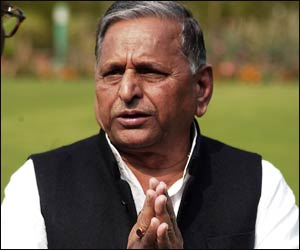
Lucknow, August 1: A peeved Samajwadi Party chief Mulayam Singh Yadav on Tuesday warned the party's elected representatives of some harsh action if they failed to meet people's expectations in Uttar Pradesh. "Nothing much has changed in last two months. Everybody seems to be catering to their own interests. This cannot be allowed any longer. If this continues, we will not be able to face people in the Lok Sabha elections," a stern Mulayam said.
Addressing the first meeting of MLCs and MLAs at the party headquarters here, Mulayam took the ministers head on. "On the very first day of the government formation, I had asked each one of you to make sure that we deliver what we have promised. I have even assured you that those who will take the right initiative will get all support from the government. But I don't see any remarkable change," Mulayam said.
In the presence of the entire top SP leadership, Mulayam expressed dissatisfaction over the manner in which SP MLCs, MLAs and ministers have conducted themselves. "I am watching every one of you and can point out by particular instance where you have faltered," Mulayam said, adding that this was neither in the interest of the party nor people or the politics of the state. "Don't be surprised if you find an unexpected reshuffle in the cabinet if I don't see a change soon," he said looking towards chief minister Akhilesh Yadav. Senior SP leaders including Mohammed Azam Khan, Shivpal Yadav and Ahmed Hasan were among those present in the meeting.
It was here that some unhappy MLAs sitting in the back rows reacted: "Kuch mantriyon ko badal hi dijiye ab (change at least some ministers now)." Mulayam, however, took the comment in his stride despite the displeasure of being interrupted reflecting on his face: "Dekh lijiye ... jab apaski log khush nahi hain to janta ka kya hoga" (See for yourself. Our own people are not happy, what to talk of the people in general)," he said as other senior leaders waved their hands to silence those who had made the remark.
Mulayam had barely completed his sentence when the entire auditorium plunged into darkness following the collapse of three grids. The meeting resumed when power was restored after 15 minutes. "People have given us a clear mandate because they were fed-up with Mayawati's misrule. They have some expectations from us and if we fail to meet them, then I am sure everyone knows what will happen," the SP supremo said. He admitted that there were problems at certain levels in terms of execution of policies. "But people are not bothered, they have voted us and they want results and rightly so," he said.
SP patriarch also cautioned party leaders to exercise restrain on party issues while speaking to the media. "We can sort them internally. Going public does not reflect well on the party's image," Mulayam said. Once again referring to a possible fallout of the failure of ministers and MLAs to deliver, Mulayam said the time is running out and we have to make it soon. "So please get back to your constituencies and ensure that the people start feeling the change. We are here to handle all the difficulties that you face while meeting the development demands of the people," he said.





Comments
Add new comment